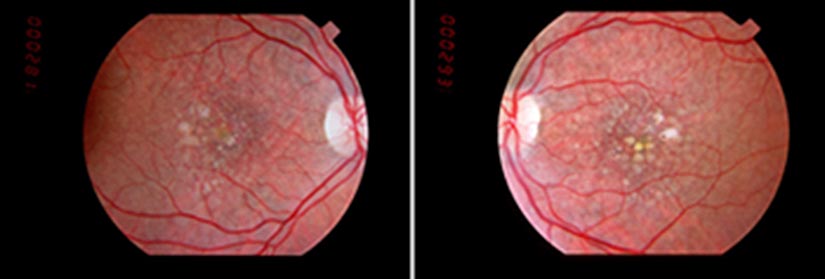Understanding Macular Degeneration and Protecting Your Vision
Learn about the causes, symptoms, and advanced treatment options for dry and wet macular degeneration with the expert team at Eye Consultants NW.
Macular degeneration affects cells in the macula, which is the part of the retina responsible for central vision. Central vision is essential for most basic tasks like reading, driving, recognizing people, etc. Thus, although macular degeneration leaves peripheral vision un-impaired, it can be quite debilitating in its advanced state.
The disease exists in two forms, dry and wet. Dry macular degeneration is by far the most common (roughly 90% of all cases). However, it is the milder of the two forms, develops gradually, and usually leads to only minor vision loss. Dry macular degeneration tends to occur when yellow fatty particles called drusen accumulate in the retina underneath the macula. This build-up results in thinning and drying-out of the macular cells.
Wet macular degeneration is less common, but the vast majority of severe vision loss cases result from this form. First, abnormal blood vessels form underneath the surface of the retina. Leakage of blood and other fluids from these blood vessels permanently damage the outside cells (which detect incoming light). As these cells are damaged, vision is lost.
The primary cause of macular degeneration remains unknown. Macular degeneration typically occurs more frequently in the aging population with patients over 60. Research has shown there are many other factors such as family history, smoking, hypertension, obesity, and/or a high cholesterol, high fat diet that may contribute towards the development of macular degeneration.
Macular degeneration symptoms may include:
- Shadows, blurriness, or holes in the center of vision
- Straight lines appear wavy
- Trouble seeing details both up close and at a distance
- Difficulty telling colors apart, especially ones close in hue
- Vision can be slow to come back after bright light exposure

Treatment for dry macular degeneration:
Unfortunately, there is no treatment for the dry form of macular degeneration. Those at high risk should schedule a checkup with their ophthalmologist at least once every one to two years, to catch the disease in its infancy. Also, it is thought that dietary supplementation of antioxidants and zinc may help to slow its development.
Treatments for wet macular degeneration:
Laser photocoagulation:
Seals abnormal blood vessels with a heated laser. This treatment will sometimes halt the disease, thus saving the remaining vision of a patient. However, the laser leaves a scar, creating a permanent blind spot in the patient´s vision. The treatment is only applicable to a small segment of cases, in which some vision is sacrificed to save remaining vision.
Photodynamic therapy:
Employs a light-activated drug and a “cold” laser. The drug is injected intravenously. Then the doctor shines the laser on the affected area, which activates the drug in the targeted tissue and blocks the leaking blood vessels. This procedure leaves no scar, and may be repeated several times as necessary.
Anti-angiogenesis drugs:
These inhibit proteins which contribute to abnormal blood vessel growth. They are known as anti-VEGF (anti-vascular endothelial growth factor) drugs. There are a variety of drugs that can be applicable for this purpose, some FDA approved, and some off-label (officially approved for a different application).
Other pharmaceutical treatments: For example, angiostatic treatments, which combat blood vessel growth with steroid injections.
My experience was excellent! There was very little wait time and the exam moved along smoothly. The Tech and Dr. Edmons were both friendly and outgoing making the appointment enjoyable. Both my wife and I are very happy to have Eye Consultants caring for our vision.
– Charles Dotson
Ready to See Clearly and Live Fully?
Experience expert eye care with personalized treatments designed just for you. Whether you need a routine exam, advanced surgery, or relief from eye discomfort, Eye Consultants is here to help.
